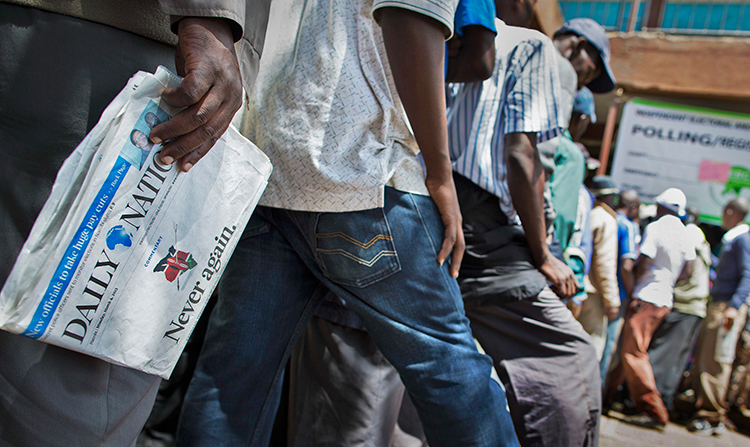Police in Nairobi on June 18 arrested Sunday Nation journalist Walter Menya on charges of soliciting a bribe of 55,000 Kenyan shillings (U.S.$531) to “write a damaging story in The Nation newspaper,” according to a police statement. The amount he was alleged to have accepted was later changed to 50,000 Kenyan shillings (U.S.$482), according to court documents seen by the Committee to Protect Journalists.
The journalist was released on June 20 after Kenya’s Director of Public Prosecutions recommended his unconditional release, according to media reports. Menya’s lawyer, Apollo Mboya, told CPJ that police would retain Menya’s laptop, an external hard drive, and phone until at least June 28, when a court was expected to rule on whether the property should be released.
Sekou Owino, a lawyer for the Nation Media Group, told CPJ that Menya met with his accuser, Kennedy Kiprcotich Koros, after Koros promised more information about a story alleging civil servants were linked to an organization that had donated to the campaign to reelect Kenyan President Uhuru Kenyatta.
Menya was invited into a car outside the Metropolitan Hospital in Nairobi to meet Koros and was handed a newspaper containing currency marked by police, he said. When Menya opened the newspaper, police descended on the car and arrested the journalist for soliciting a bribe, Owino said.
Police accused Menya of accepting the bribe to write a story published in the June 18 Sunday Nation that alleged three senior civil servants had links to an organization that recently held a fundraising event for Kenyatta’s campaign, Mboya said. Kenyan law prohibits civil servants from participating in political campaigns.
“To us it looks like entrapment,” Owino said.
When Menya appeared in court on June 20, the state said it would not pursue charges and recommended his unconditional release, according to the lawyers and news reports.
A YouTube user on June 19 published audio purportedly recording conversations between Menya and Koros discussing payment for the online publication of a story. The recordings circulated in Kenyan media and social media but were not introduced as evidence in court, Menya told CPJ.
“Unless they present them in court and tell us where they got them from, I will just assume they are audios they made up themselves,” Menya told CPJ. “If the police are serious about prosecuting the case, then one wonders why they are trying to do it through social media,” he said.
